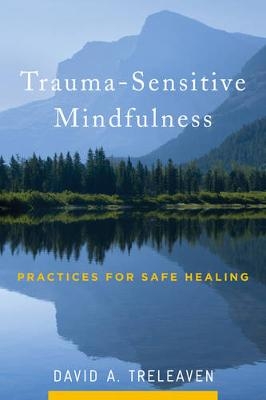
Trauma-Sensitive Mindfulness
Practices for Safe and Transformative Healing
Seiten
2018
WW Norton & Co (Verlag)
978-0-393-70978-0 (ISBN)
WW Norton & Co (Verlag)
978-0-393-70978-0 (ISBN)
Tools for implementing trauma-sensitive mindfulness practice.
From elementary schools to psychotherapy offices, mindfulness meditation is an increasingly mainstream practice. At the same time, trauma remains a fact of life: the majority of us will experience a traumatic event in our lifetime and up to 20% of us will develop posttraumatic stress. This means that anywhere mindfulness is being practised, someone in the room is likely to be struggling with trauma.
At first glance, this appears to be a good thing: trauma creates stress and mindfulness is a proven tool for reducing it. But the reality is not so simple.
Drawing on a decade of research and clinical experience, psychotherapist and educator David Treleaven shows that mindfulness meditation—practised without an awareness of trauma—can exacerbate symptoms of traumatic stress. Instructed to pay close, sustained attention to their inner world, survivors can experience flashbacks, dissociation and even retraumatisation.
This raises a crucial question for mindfulness teachers, trauma professionals and survivors everywhere: How can we minimise the potential dangers of mindfulness for survivors while leveraging its powerful benefits?
Trauma-Sensitive Mindfulness offers answers to this question. Part I provides an insightful and concise review of the histories of mindfulness and trauma, including the way modern neuroscience is shaping our understanding of both. Through grounded scholarship and wide-ranging case examples, Treleaven illustrates the ways mindfulness can help—or hinder—trauma recovery.
Part II distills these insights into five key principles for trauma-sensitive mindfulness. Covering the role of attention, arousal, relationship, dissociation and social context within trauma-informed practice, Treleaven offers 36 specific modifications designed to support survivors’ safety and stability. The result is a groundbreaking and practical approach that empowers those looking to practise mindfulness in a safe, transformative way.
From elementary schools to psychotherapy offices, mindfulness meditation is an increasingly mainstream practice. At the same time, trauma remains a fact of life: the majority of us will experience a traumatic event in our lifetime and up to 20% of us will develop posttraumatic stress. This means that anywhere mindfulness is being practised, someone in the room is likely to be struggling with trauma.
At first glance, this appears to be a good thing: trauma creates stress and mindfulness is a proven tool for reducing it. But the reality is not so simple.
Drawing on a decade of research and clinical experience, psychotherapist and educator David Treleaven shows that mindfulness meditation—practised without an awareness of trauma—can exacerbate symptoms of traumatic stress. Instructed to pay close, sustained attention to their inner world, survivors can experience flashbacks, dissociation and even retraumatisation.
This raises a crucial question for mindfulness teachers, trauma professionals and survivors everywhere: How can we minimise the potential dangers of mindfulness for survivors while leveraging its powerful benefits?
Trauma-Sensitive Mindfulness offers answers to this question. Part I provides an insightful and concise review of the histories of mindfulness and trauma, including the way modern neuroscience is shaping our understanding of both. Through grounded scholarship and wide-ranging case examples, Treleaven illustrates the ways mindfulness can help—or hinder—trauma recovery.
Part II distills these insights into five key principles for trauma-sensitive mindfulness. Covering the role of attention, arousal, relationship, dissociation and social context within trauma-informed practice, Treleaven offers 36 specific modifications designed to support survivors’ safety and stability. The result is a groundbreaking and practical approach that empowers those looking to practise mindfulness in a safe, transformative way.
David A. Treleaven, PhD, is an author and trauma professional specializing in the intersection of mindfulness, meditation, and trauma. An international teacher, his work empowers practitioners worldwide with tools for trauma-informed mindfulness practice. He resides in Berkeley, California.
| Erscheinungsdatum | 29.01.2018 |
|---|---|
| Vorwort | Willoughby Britton |
| Verlagsort | New York |
| Sprache | englisch |
| Maße | 160 x 244 mm |
| Gewicht | 514 g |
| Themenwelt | Geisteswissenschaften ► Psychologie ► Persönlichkeitsstörungen |
| Medizin / Pharmazie ► Medizinische Fachgebiete ► Psychiatrie / Psychotherapie | |
| ISBN-10 | 0-393-70978-7 / 0393709787 |
| ISBN-13 | 978-0-393-70978-0 / 9780393709780 |
| Zustand | Neuware |
| Haben Sie eine Frage zum Produkt? |
Mehr entdecken
aus dem Bereich
aus dem Bereich
Buch | Hardcover (2012)
Westermann Schulbuchverlag
CHF 44,90
Schulbuch Klassen 7/8 (G9)
Buch | Hardcover (2015)
Klett (Verlag)
CHF 29,90
Buch | Softcover (2004)
Cornelsen Verlag
CHF 23,90


